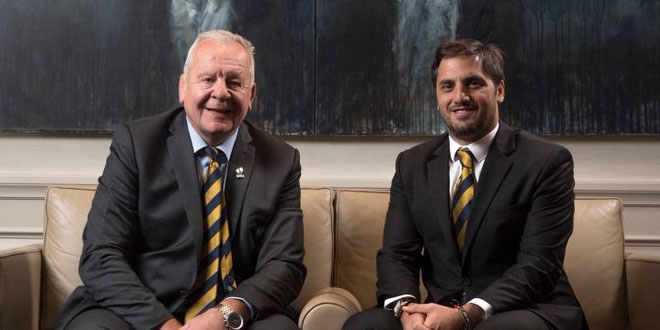Wednesday’s announcement from World Rugby was extremely warmly received. But did the election of Bill Beaumont and Agustín Pichot to Chairman and Vice-Chairman signal in a fresh approach or is it to be more of the same from World Rugby? In order to consider this very question I have put together the following ten talking points of the new Beaumont and Pichot Regime.
1. Is it Traditionalism or Progression?
Actually it is both and this is clearly the chosen path for this specific reason. It is the coming together of the young and old both in terms of the respective ages of Beaumont and Pichot and in pushing for change without upsetting the establishment.
Despite more than a decade having passed-by the decision which allocated New Zealand the hosting rights to Rugby World Cup 2011 ahead of Japan remains fresh. It exposed the core problems of rugby’s governance – the deck is stacked in favor of a minority.
The decision was extremely unpopular with comments made by Japanese Yoshiro Mori being commonly shared. “The established nations pass the ball around their friends . . . Only the interests of the bigger unions remain“. This gave way to an altered process for Rugby World Cups 2015 and 2019 which saw Japan winning 2019 hosting rights after being recommended 2019 hosts and subsequently being voted in by the World Rugby Council.
A vital part of New Zealand’s winning came down to deals struck in exchange for home internationals against the All Blacks. Argentina’s home test against New Zealand in June 2006 came after a late arrangement was made with the NZRU to back New Zealand’s bid after South Africa lost in the opening round.
In addition, despite authorities having kept it a closely guarded secret some of the 13 votes New Zealand got, compared to Japan’s 8, are not so secret after all. Six of such were Ireland, Scotland and Wales who, in return hosted more tests against the All Blacks than usual.
Having not done so since 1978 the All Blacks competed a ‘Grand Slam Tour’ of The U.K. and Ireland in November 2005, playing a test each against England, Ireland, Scotland and Wales. This was repeated in both 2008 and 2010 but discontinued thereafter.
Sir Syd Millar was World Rugby’s (former IRB) Chairman in 2005 and was replaced by the more global thinking Bernard Lapasset in 2008. The Frenchman succeeded where the Irishman Millar failed in making Rugby Sevens an Olympic sport. Millar had replaced the terminally-ill Welshman Vernon Pugh as Chairman in 2002.
2. What are Beaumont Credentials?
So after eight years World Rugby sees the return of a Chairman from the Home Unions. On paper this is not exactly progression but what can Beaumont offer? For starters he was one of England’s two Council members in 2005 when his country backed Japan not New Zealand to host Rugby World Cup 2011.
In terms of service Beaumont is very much a World Rugby veteran. He joined the Voting Council in 1999, making him the third longest service voter after Italy’s Giancarlo Dondi (1996) and Jacques Laurans (1997).
On the field he captained England, winning the Six Nations Grand Slam title in 1980 and was capped seven times by the British and Irish Lions. As a player and club representative he was well respected as a generous man and one of great respect. Rugby values walk the talk in Beaumont.
3. So what about Pichot?
As a player Pichot played in four Rugby World Cups, making history in both 1999 and 2007. He captained Argentina to the Semi Finals but it was his outrage at the 2003 match scheduled which, arguably, spoke just as loudly.
In Australia in 2003 Argentina had fifteen days to play four pool matches. Pool rivals Australia and Ireland had twenty and twenty-one days each. So controversial was the schedule that Argentina had played all four games before England played for the third time. Italy and Tonga received comparably unsporting draws with their opponents New Zealand and Wales being the benefactors.
Referring to the founding members Australia, England, France, Ireland, New Zealand, Scotland South Africa and Wales Pichot told reporters “now the IRB have the eight countries they wanted in the Quarter Finals.”
Getting revenge against Ireland in 2007 was certainly sweet for Pichot just like it was for many from non-founding countries. Given equal opportunities the playing field was leveled out and this has proven so in all World Cups since the deplorable one that John O’Neill’s administration concocted in 2003.
After hanging up his boots Pichot set his sights on giving back to the community. His campaigns for Argentina to enter the Tri Nations and Super Rugby were both achieved and, provided Los Pumas with the means to an end of long-term stability.
His crusade would not end there as he used his majestic diplomatic and marketing skills to make the Americas Rugby Championship a reality. It underlined both his contribution and his vision.
4. Their Central Task
The vastly different resume’s of Beaumont and Pichot are common in their grass roots heritage and this is where they will compliment one another. Their shared love for the sport together with their vast understanding of economic management is to be harnessed to achieve the central task of taking rugby forward in time for Japan to host a Rugby World Cup like no other.
After 2019 it is hoped that more diverse fixture list will be utilized for international competition. Getting the unions to play ball with the idea of tours to less familiar places, increasing relations with Tier 2 unions and expanding existing competitions are such instances.
5. Global Calendar
The success or failure of Beaumont may come down to one thing alone: the global calendar. With season’s played in different months in different countries there is no global season and Beaumont has been vocal about changing this.
At present there is a divide which sees leading European professional leagues finishing in late May or early June most years then starting again in late August or early September. Conversely the SANZAAR unions have their off-season in December and January. Beaumont must find a way to have universal off-season to make sure all test matches are played at favorable times.
6. Rugby World Cup 2023
Pichot made no secret of his desire for Argentina to host Rugby World Cup 2023. UAR President Carlos Araujo decided against it based on his wish of making sure Argentina’s entrance into Super Rugby was a success.
Bidding are to be three or four unions – France, Ireland, Italy and South Africa. Of them three are previous hosts with France having hosted matches in 1991, 1999 and 40 of the 48 games in 2007. Ireland hosted matches in both 1991 and 1999 while South Africa hosted alone in 1995. South Africa’s potential hosting in 2023 is expected to be blocked by the country’s own government.
Italy is unique in never having hosted in any capacity whatsoever. Determining the vision of Beaumont and Pichot will become increasingly clear over the coming months as the bids are presented and publicized. Will they back expanding to Italy or taking a more conservative route? Will new frontiers outweigh France’s vastly superior financial possibilities and another a Home Union hosted tournament?
7. Six Nations, Georgia and Romania
Italy’s potential hosting may well depend, in no small part, on the international relations of Italian rugby. Having underperformed in the 2016 Six Nations the cases of Romania and, in particular, Georgia of meriting greater opportunities have become increasingly publicized. The Six Nations lacks promotion, making Georgia’s dominance of the European Nations Cup all the more frustrating.
Beaumont is to become World Rugby Chairman after having been extremely prominent in the Six Nations as an administrator. With both Georgia and Romania now having seats on the Council the picture has changed and World Rugby must act to modernize the closed shop that is the Six Nations.
8. USA
The third new addition is that of the USA who joins Canada, Argentina, Rugby Americas North and Sudamérica Rugby in having votes. It gives the Americas greater power than ever before, the combined north-south region set to become the second most powerful in global rugby.
Seen as a vital component of rugby’s expanding profile what is good for the USA is good for World Rugby. Essential over the coming years will be ensuring the success of PRO Rugby to make it a competition to bridge the gap from club rugby to international level. So much is to be gained with Canada doing so tremendously too.
9. Pacific Islands
Not so lucky are the Pacific Islands. None of Fiji, Samoa or Tonga met the requirements to acquire a seat on there World Rugby Council. They are well and truly in the abyss and with little to no hope of meeting the financial requirements any time soon.
Problems of corruption and mismanagement have not helped the case of any of them and with professionalism out of consideration they will all need to get by primarily on funding. Self-sufficiency continues to be the goal but making this possible has proven problematic under different World Rugby administrations.
10. Unions Rising in Tiers
Argentina and Italy have been Tier One unions since the turn of the millennium but it has taken until now for them to become equals to the eight founding members. Their organizational capabilities have proven to be elite, making their cases for hosting Rugby World Cups in the future all the stronger.
Attention will be on Japan becoming the next to do so. Japan’s hosting in 2019 combined with the extraordinary campaign in England 2015, the Japanese Top League and Super Rugby place Japan in a position to make the leap.
Further down great efforts are underway from others. Both Georgia and Romania have part of the package to become Tier 1 unions and World Rugby must act to encourage their further development. Another is Uruguay who has the means of moving from Tier 3 to Tier 2 within twelve months.
 Americas Rugby News Rugby news from across the Americas!
Americas Rugby News Rugby news from across the Americas!




